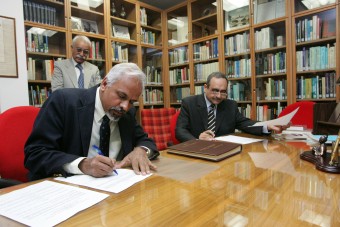Personal tools
News from ICTP 110 - Commentary

The strong ties between ICTP and Pakistan's scientific community have just become stronger with the signing of a memorandum of agreement.
Science in Pakistan
Parvez Butt, chairman of the Pakistan Atomic Energy Commission (PAEC), visited Trieste in September to sign a memorandum of agreement with ICTP that will enable 25 Pakistani scientists to visit the Centre each year to participate in training and research activities. PAEC will cover travel costs to and from Pakistan, and ICTP will cover hospitality costs during the scientists' stay in Trieste.

K.R. Sreenivasan and Parvez Butt signing memorandum of agreement
in Abdus Salam's office.
Abdullah Sadiq looks on.
Butt noted that "this effort is the latest example of a long
and fruitful relationship between ICTP and Pakistan's scientific
community." He pointed with pride to the fact that ICTP was
founded by Pakistani-born scientist Abdus Salam (Nobel Laureate
in Physics 1979) during the 1960s and that Salam continued to
oversee the administration of the Centre until the early 1990s
when ill health forced him to relinquish the reins.
"ICTP," he said, "has been a primary point of destination
for Pakistani physicists and mathematicians ever since the Centre
opened its doors in 1964." Indeed over the past 40 years,
more than 1300 Pakistani scientists have participated in ICTP
research and training activities. In addition, more than 90 scientists
have been appointed ICTP Associates, which has enabled them to
forge strong and lasting relationships with the Centre. ICTP Associates
from Pakistan include Riazuddin, director, National Centre for
Physics, (NCP); Ghulam Murtaza, first Salam professor of physics
at Government College in Lahore; and Abdullah Sadiq, former rector
of the Pakistan Institute of Engineering and Applied Sciences
(PIEAS) and a member of PAEC.
"Salam spent his entire adult life urging Pakistan and the
rest of the developing world to secure a proper place for science
in their plans for development. He was convinced that a nation's
development efforts could only be built on a firm foundation of
science and technology."
"For decades Salam was more renowned outside of Pakistan
than inside," says Butt. "But that is no longer the
case. Even more importantly, Salam's ideas are finally taking
hold in Pakistan's science policies." Butt points proudly
to more than a seven-fold increase from US$4.4 million in 1999-2000
to US$34 million in 2004-2005 in Pakistan's annual science and
technology budget. He also cites substantial investments in communication
technologies that have enabled virtually every university and
research centre in Pakistan to be connected to the internet. Other
areas of primary concern include biotechnology and indigenous
and medicinal plants.
"Thanks in large measure to ICTP, Pakistan has developed
a strong community of physicists and mathematicians and we are
now able to tap this pool of scientists to participate in a wide
range of disciplines where knowledge of physics and mathematics
can play an important role. These fields include weather and climate,
bioinformatics, lasers and optics, and nanotechnology."
PAEC has historically been Pakistan's largest and most active
science institution. In total, PAEC consists of 72 centres, including
the Pakistan Institute of Nuclear Science and Technology (with
a staff of 20,000, it is the premier centre in PAEC's constellation
of centres) and the Pakistan Institute of Engineering and Applied
Science that awards degrees in a variety of fields. The National
Institute for Biotechnology and Genetic Engineering (NIBGE) conducts
advanced research in the fields of agriculture and medicine, and
13 medical centres serve some 300,000 patients each year.
"Today," says Butt, "specialised science centres
unaffiliated with PAEC are cropping up everywhere in Pakistan
in both the basic and applied sciences. The growing number and
diversity of these centres is a reflection of the government's
commitment to science. Our desire to strengthen our ties with
ICTP, moreover, is an indication that Pakistan is increasingly
interested in reaching out to international organisations and
we are using more and more of our own resources to do so. All
in all, the trends for science in Pakistan look good."